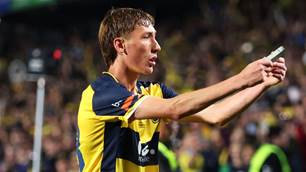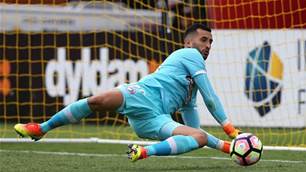Besart Berisha, Milos Ninkovic, Milos Dimitrijevic. Names that meant nothing to Australians a few years ago, now epitomize the very best of the A-League. But what’s causing this influx of Eastern European talent and what does it mean for the Australia?
It all began with a 2012 BBC documentary entitled Stadiums of Hate, covering the inextricable links between football hooliganism and racism within Ukraine. It exposed fan violence, rioting, nationalist symbolism and neo-Nazi protestors to a shocked global audience, only weeks before the tournament.
In its most shocking incident, the documentary showed a gang of Dynamo Kiev fans brutally bashing a group of Indian students, who had attended a match in Dynamo colours.
Sydney FC marquee and Johnny Warren medalist Milos Ninkovic was a Dynamo stalwart at the time, but his decorated spell in Kiev was coming to an end.
Ninkovic had played in the Ukrainian capital for almost a decade, giving him an incredible insight into Eastern European football. The Euros were overshadowing a much darker football culture, which many players were already aware of.
The Ukrainian government – like many other Eastern European nations – doesn’t collect statistics on racism-motivated violence at football matches. Human rights organisations have criticised this as evidence that Eastern European governments routinely ignore the issue.
Clashes at the subsequent 2016 Euros, involving Ukrainian, Polish and Russian fans again highlighted the aura of intimidation, xenophobia and violent nationalism that pervades Eastern European football.

This is partly the result of widespread corruption. Almost 10 per cent of Ukrainian footballers have been approached by match fixing organisations. Two Ukrainian football club Presidents have been arrested over the past decade for offences ranging from arson and affiliation with organised crime to murder.
Steadily falling crowd attendances in the Ukrainian Premier League (UPL) – which averages less than 6,000 people per match – and a crumbling Ukrainian economy also encourage UPL clubs to rely on other, dubious forms of income.
Dynamo Kiev, for example, holds licenses to export nuclear arms and precious metals. A former Ukrainian international, remarking on the struggles of playing football in his homeland, publicly told the BBC: “There are very few Ukrainian clubs that exist primarily to play football.”
Related Articles

Socceroo-in-waiting seals Championship deal

Fringe Socceroo swerves A-League to remain in Europe after Fulham exit













